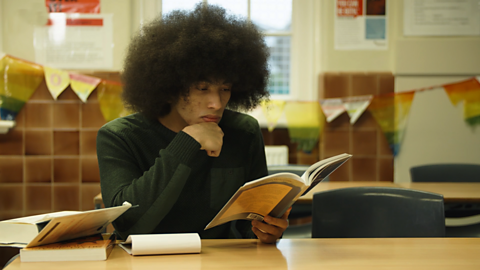Are you thinking of taking A-levels? - Challenges faced by A-level students
The jump from GCSE to A-level can feel like a big leap, and for many it feels bigger than moving from A-level to a degree. So why is that? We asked our coaches what it was like for them – woes included!
In this short film our coaches talk about their experience of taking A-levels.
"College for me was interesting. I was doing two A-levels and then a BTEC and then two resits as well, so I had a lot going on."
"Because I'd found GCSEs quite easy, I thought A-levels were going to be just as easy. I got my results, I got a D, Cs and two Bs as well."
"GCSEs, I just walked in there and I was alright. I already knew that I'd done well so I just got the paper and I just walked out, but my A-level ones, I had to resit nearly all of my exams and I basically had to do two years of sixth form in one year."
"On results day, I had a complete panic. I opened that envelope and was like, 'That's it, my life is over. I'm never going to be a nurse, I'm never going to go to university.' And I just started applying for all these jobs that I would never actually want to do, but in my head, that was all that was left now, university was completely out the window. But I think in reality if I'd have just kept calm and looked at my options, it wouldn't have seemed quite as bad as it did."
"It does involve a lot of independent study as you're not being taught the course and the curriculum anymore, so you do have to go over things yourself a lot of the time and factor that in."
"I think it's about being driven to want to go and to want to succeed which is the most important thing."
"These questions that come up in the previous exams, they come up every year. They might change one or two words. So I used to just overlook them and maybe do one past exam paper and that was it. But I realised, after speaking to some of the students that got the As, they said that they'd done every single past paper and they'd done the papers from the previous specification."
"I set myself out a revision timetable, I made time to go and see some of my teachers with the subjects that I was struggling with, I made flashcards, I just put in all the effort that I should have done the first time around."
"Once that was done, in the second year I could focus on what I wanted to and I ended up getting really good results. I was proud of myself in the sense that I managed to juggle all of that."
"Eventually, in my second year, I managed to pull that D up to an A*."
"If you are in a similar situation where you're really struggling to make that leap, I would recommend just telling teachers because if they don't know then they can't help you. The second time around, when I was getting that extra support, it made a massive difference."
Comparing A-levels and GCSEs: Key differences
- You will study fewer subjects than you did at GCSE but, as A-levels are advanced qualifications, your will need to develop a much deeper understanding and knowledge of these subjects
- Because you’re picking fewer subjects, A-levels are a good opportunity to start specialising and thinking about potential future careers
- At A-level, you have a lot less input from teachers and are expected to do more independent study
- However, you normally go to more lessons, so you can have more time with your teachers to ask questions and work on projects
- While A-levels are a great entry ticket to university, there are some subjects that certain unis won’t accept, and some they will prefer – so do your research!

Discover more on Bitesize
Can I mix A-levels and vocational qualifications? video
Watch our experts with their insight into whether taking a mixture of traditional and vocational courses could be right for you

Study-life balance
Guidance on how to find the right balance between work and play to reduce stress.

3 students studying T-levels share their experiences
We spoke to three students who are in their final year of their T-level, to find out what it’s really like to study one at college.
